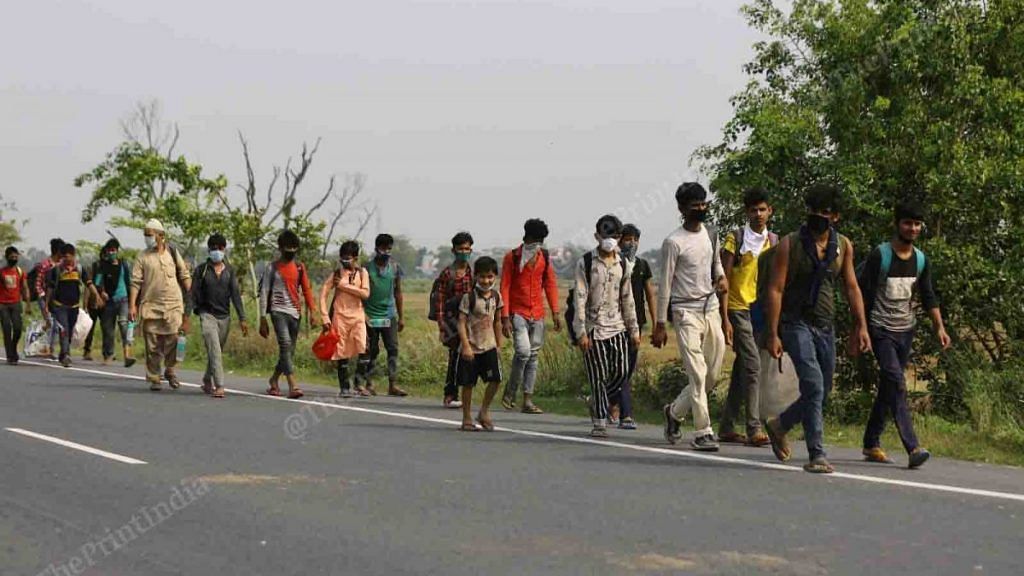New Delhi: The thousands of migrant labourers facing a crisis amid the Covid-19 lockdown would have had a safety net if a 2008 law providing social protection to unorganised workers had been implemented. But successive governments have failed to do so.
The current database with the government shows 28 lakh migrants were in relief camps opened by state governments. These migrants were made to furnish their Aadhaar and bank account details. However, officials have said seven to eight crore migrants either continue to reside within the industries they were working in, or have travelled back to their homes. The government has no details about these workers.
One of the provisions in the Unorganised Sector Workers’ Social Security Act, 2008, passed by the Manmohan Singh-led UPA government, was for a database of unorganised workers, which would have helped migrants in the current situation.
Officials now say the law had some inherent flaws that prevented its implementation, which has led to the current crisis. But experts say governments could have fixed it and implemented it in the intervening years.
Also read: Why Modi govt dropped the idea of transferring cash to migrant workers during lockdown
Crux of the law
Social security schemes primarily cover only the organised sector, but India’s economy is largely informal. According to various national sample surveys, over 90 per cent of India’s workforce is employed in the unorganised sector. Therefore, workers don’t have access to social security provisions, such as pensions, insurance or provident fund.
The 2008 law intended to provide social security and job protection to at least 37.5 crore workers, according to the objectives stated in the draft bill when it was moved in Parliament. It covers unorganised workers of two categories: self-employed and wage-employed. Eight social welfare schemes are outlined in it for the beneficiaries.
The law provides for the Union government and states to constitute “social security advisory boards” to recommend “suitable welfare measures for different sections of unorganised sector workers”. A key feature of the law allows state boards to issue smart portable identification cards to unorganised workers for developing a database of migrants employed in different cities.
Database would’ve helped migrants in lockdown
According to labour economist Prof. Shyam Sundar of XLRI, Jamshedpur, if the administrative measures under the law had been operative, a database would have enabled states and Centre to provide immediate relief to migrants in the present crisis.
“The law envisages a system to prepare a database of unorganised workers employed in certain industries to give them some visibility. Under the act, states have to establish worker facilitation centres (WFC) where migrant workers can register themselves for a ‘smart portable identification card’,” he said.
“WFC had to act as a bridge between the unorganised sector and local authorities,” Sundar explained, but added that none of the measures have been implemented.
Smart cards, he said, would have made it easy to trace transient migrants. “Right now, authorities have done it through apps and accounted for 5 million migrants, which I believe is a gross underestimate,” Sundar added.
Also read: Why fixing unorganised sector can be Modi’s biggest Covid-19 economic challenge
‘Flaws’ that hampered implementation
Officials say the implementation of the law has been hampered by some design flaws.
“The National Commission for Enterprises in the Unorganised Sector had recommended two separate bills for agricultural workers and unorganised non-agricultural workers. The act does not differentiate between agricultural and non-agricultural workers,” a labour ministry official told ThePrint on the condition of anonymity.
“In order to register as an unorganised worker, an individual must be 14 years of age and declare himself an unorganised worker. There is no process to verify such declaration in the Act,” the official added.
Experts say the law was passed in a hurry because of pressure from Left parties who were then supporting the ruling dispensation. The Left moved amendments, providing for a national welfare fund and health and insurance schemes for the workers, according to an analysis by the PRS Legislative Research.
“The intention was to protect workers in the unorganised sector, including agriculture, tobacco, handloom, construction and leather,” said Tapan Sen, former CPI(M) MP and leader of the Centre of Indian Trade Unions (CITU).
But the law required its intended beneficiaries to earn the equivalent of below-poverty line wages. “A large percentage of unorganised workers do not fall under the BPL limit,” Sen said.
‘Government slept over it’
However, Prof. Sundar said the flaws were not a reason to dump the law. Rather, the successive governments should have worked to improve it.
“Even assuming the law is a damp squib, as it bifurcated the unorganised sector, the question that comes to the fore is have we administered the act as per the scheme? And the answer is no,” the XLRI economist said.
“The government has slept over it for over 11 years now. Neither the UPA (n)or NDA had the will to amend the law, if it was required to widen its ambit to include the left-out category of migrants,” he added.
Also read: Social security net could be Modi govt’s route to protect unorganised workers
